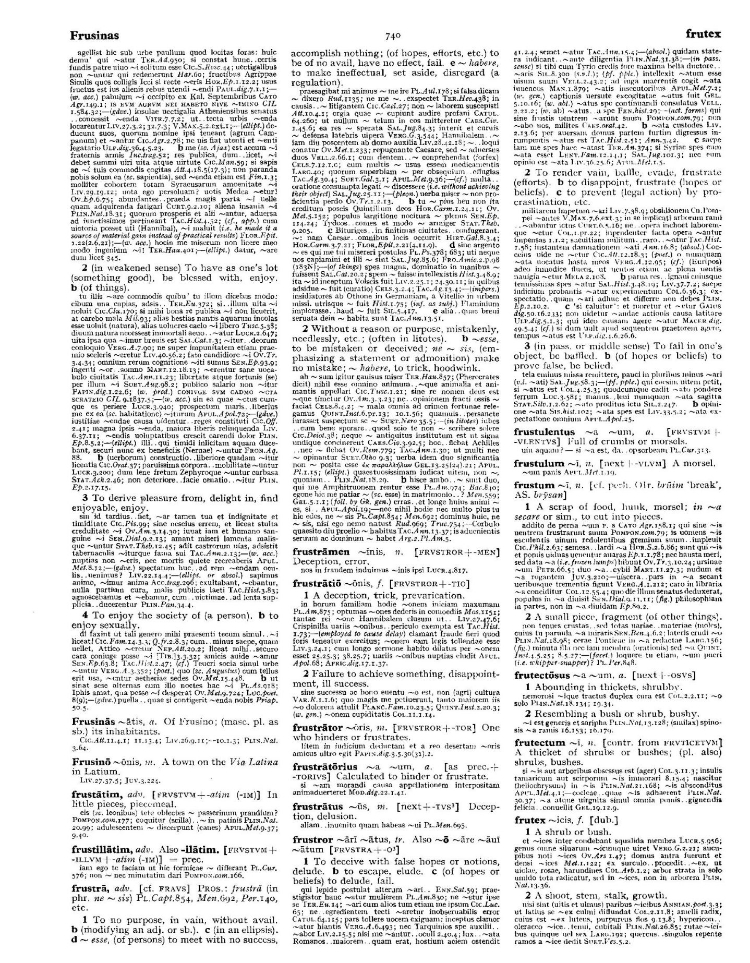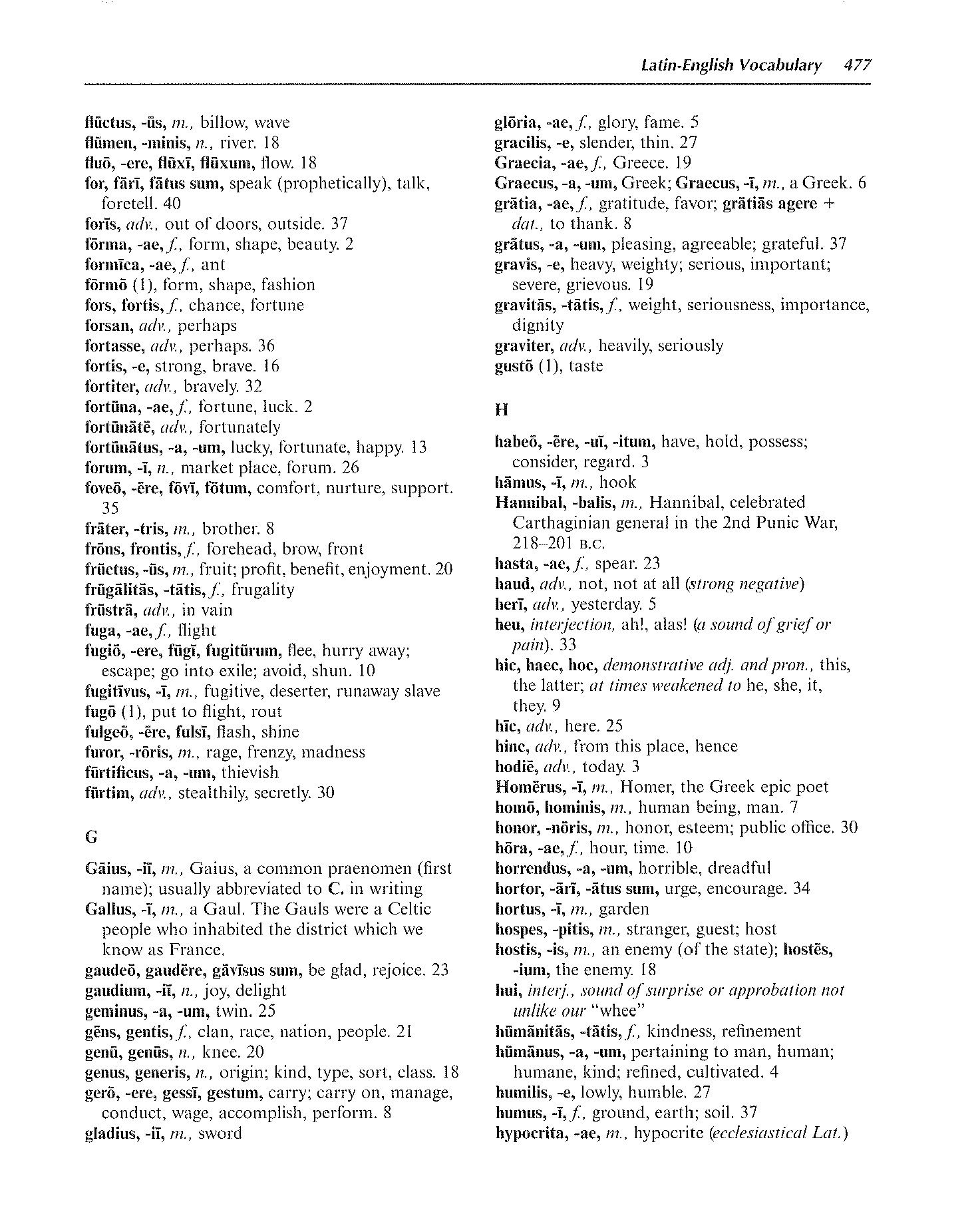
page_listing.tpl
page_subListingDetails.tpl
sub_listingDetails_style1.tpl
sub_listingDetails.title.tpl
frūstrā in vain
frūstrā is a Latin Adverb that primarily means in vain.
Definitions for frūstrā
Wheelock's Latin
Adverb
- 1
in vain
Oxford Latin Dictionary
Adverb
- 1
To no purpose, in vain, without avail. (b) (modifying an adj. or sb.). (c) in an ellipsis). (d) ~ esse, (of persons) to meet with no success, accomplish nothing; (of hopes, efforts, etc.) to be of no avail, have no effect, fail. e ~ habere, to make ineffectual, set aside, disregard (a regulation).
- 2
Without a reason or purpose, mistakenly, needlessly, etc.; (often in litotes). (b) ~esse, to be mistaken or deceived; ne ~ sis, (emphasizing a statement or admonition) make no mistake; ~ habere, to trick, hoodwink.
Sentences with frūstrā
Latin to English
Beatus quippe vult esse, etiam non sic vivendo ut possit esse. Quid est ista voluntate mendacius? Unde non frustra dici potest omne peccatum est mendacium.Compare Man indeed desires happiness even when he does to live as to make happiness impossible. What could be more of a lie than such a desire? This is the reason why every sin can be called a lie.
Sero sentio frustra sui aut pecunia studeo aut imperium, aut opes, aut gloria.Compare They perceive too late that they have in vain pursued money, or power, or influence, or glory.
Non horam tecum esse potes, non otia recte ponere, teque ipsum vitas fugitivus et erro, iam vino quaerens, iam somno fallere Curam; frustra: nam comes atra premit sequiturque fugacem.Compare You cannot bear your own company for an hour together, you cannot employ leisure wisely, you would give yourself the slip, a runaway and a vagrant, seeking now with wine, now with sleep, to cheat Care. In vain: fast as you run Care is at your side or at your heels.
Data sources
Notes
- Definitions
- Frederick M. Wheelock, Wheelock's Latin, 6th ed., rev. Richard A. LaFleur (New York, NY: HarperCollins Publishers, 2005): 477.
- P. G. W. Glare, Oxford Latin Dictionary, Vols. 1-8 (Oxford: Clarendon Press, 1982): 740.
- Word frequencies
- Christopher Francese, "Latin Core Vocabulary," Dickinson College Commentaries, last modified 2014, http://dcc.dickinson.edu.
- Paul B. Diederich, The Frequency of Latin Words and Their Endings, PhD diss., (Columbia University, 1939).
- Louis Delatte, Suzanne Govaerts, Joseph Denooz, and Etienne Evrard, Dictionnaire fréquentiel et index inverse de la langue latine [Frequency Dictionary and Inverse Index of the Latin Language] (Liège, Belgium: Laboratoire d'analyse statistique des langues anciennes de l'Université de Liège [L.A.S.L.A.], 1981): 125.
Bibliography
Allen, Joseph H. Allen and Greenough's New Latin Grammar for Schools and Colleges: Founded on Comparative Grammar. Edited by James B. Greenough, George L. Kittredge, Albert A. Howard, and Benjamin L. D'Ooge. Boston, MA: Ginn & Company, 1903.
Crystal, David. A Dictionary of Linguistics and Phonetics. 6th ed. Oxford, UK: Blackwell Publishing, 2008.
Delatte, Louis, Suzanne Govaerts, Joseph Denooz, and Etienne Evrard. Dictionnaire fréquentiel et index inverse de la langue latine [Frequency Dictionary and Inverse Index of the Latin Language]. Liège, Belgium: Laboratoire d'analyse statistique des langues anciennes de l'Université de Liège (L.A.S.L.A.), 1981.
Diederich, Paul B. The Frequency of Latin Words and Their Endings. PhD diss., Columbia University, 1939.
Francese, Christopher. "Latin Core Vocabulary." Dickinson College Commentaries. Last modified 2014. http://dcc.dickinson.edu/latin-vocabulary-list.
Gildersleeve, Basil L., and Gonzales Lodge. Gildersleeve's Latin Grammar: Third Edition, Revised, and Enlarged. 3rd ed. London, England: Macmillan and Co., 1903.
Glare, Peter G.W. Oxford Latin Dictionary. Vols. 1-8. Oxford, England: Clarendon Press, 1982.
Krüger, Bernd. "Latin Conjugation Tables." Cactus2000. Accessed May 5, 2023. https://latin.cactus2000.de/index.en.php.
Pierson, Nick. "Sound of Text." Accessed October 26, 2019. https://soundoftext.com.
Wheelock, Frederick M. Wheelock's Latin. 6th ed. Revised by Richard A. LaFleur. New York, NY: HarperCollins Publishers, 2005.
Wiktionary Contributors. "Victionarium." Wikimedia Foundation, Inc. Updated March 18, 2019. https://la.wiktionary.org/wiki/Victionarium:Pagina_prima.
Citation
Chicago (17th ed.)
Allo Contributors. "frūstrā (adv.) - Latin Word Definition." Allo Latin Dictionary. Last modified . Accessed February 19, 2026. http://ancientlanguages.org/latin/dictionary/frustra.
Entry created on . Last updated on .







